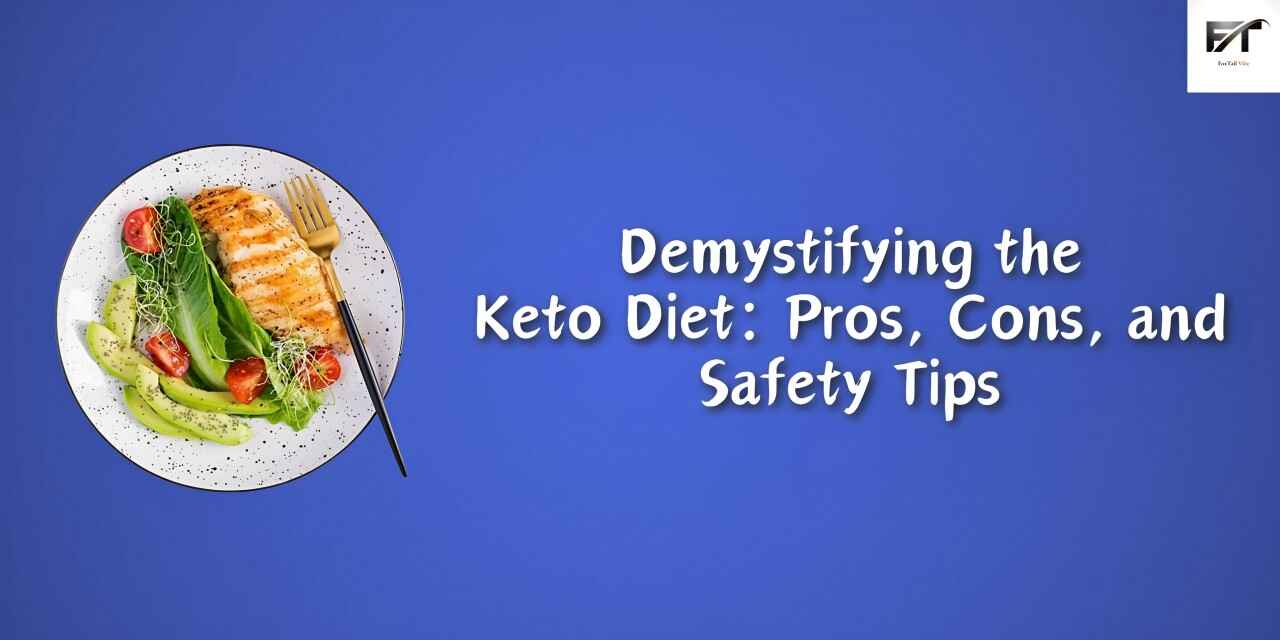In recent years, the keto diet has gained immense popularity as a way to lose weight and improve health. But what exactly is the keto diet, and is it right for you? Let’s delve into the details, weighing the pros, cons, and safety tips to help you make an informed decision.
Understanding the Keto Diet
The keto diet, short for ketogenic diet, is a low-carbohydrate, high-fat eating plan designed to put your body into a state of ketosis. Ketosis is a metabolic state where your body burns fat for fuel instead of carbohydrates. To achieve ketosis, followers of the keto diet drastically reduce their carbohydrate intake while increasing their consumption of fats and moderate intake of protein.
Pros of the Keto Diet

- Effective Weight Loss: One of the main reasons people turn to the keto diet is its ability to promote weight loss. By restricting carbohydrates, the body is forced to burn fat for energy, leading to a reduction in body fat.
- Improved Blood Sugar Control: For individuals with type 2 diabetes or insulin resistance, the keto diet may help stabilize blood sugar levels by reducing carbohydrate intake, thus decreasing the need for insulin.
- Increased Energy Levels: Some people report experiencing higher energy levels and improved mental clarity while following the keto diet, possibly due to more stable blood sugar levels and the steady supply of energy from fats.
- Reduced Appetite: The high-fat content of the keto diet, along with adequate protein intake, can help keep you feeling full and satisfied, potentially reducing cravings and overall calorie intake.
- Potential Health Benefits: Some studies suggest that the keto diet may have therapeutic effects in treating certain medical conditions, such as epilepsy, Alzheimer’s disease, and certain types of cancer. However, more research is needed in these areas.
Cons of the Keto Diet
- Initial Side Effects: When transitioning to the keto diet, some people may experience symptoms often referred to as the “keto flu,” including fatigue, headaches, dizziness, nausea, and irritability. These symptoms typically subside within a few days to a week as the body adjusts to using fat for fuel.
- Nutrient Deficiencies: Since the keto diet restricts many high-carbohydrate foods like fruits, whole grains, and legumes, there is a risk of nutrient deficiencies, particularly in vitamins and minerals like vitamin C, potassium, and magnesium. It’s essential to incorporate a variety of nutrient-dense foods to mitigate this risk.
- Difficulty Sustaining Long-Term: The strict nature of the keto diet, including limited food choices and the need to track macronutrient intake, can make it challenging to maintain over the long term for some individuals.
- Potential Negative Impact on Cholesterol Levels: While some people experience improvements in cholesterol levels on the keto diet, others may see an increase in LDL cholesterol (often referred to as “bad” cholesterol) due to the high intake of saturated fats. It’s crucial to monitor cholesterol levels regularly if following the keto diet.
- Social Limitations: Participating in social events and dining out may become more challenging while following the keto diet, as many traditional foods and restaurant dishes are high in carbohydrates.
Safety Tips for the Keto Diet
- Stay Hydrated: Drinking plenty of water is essential on the keto diet, especially during the initial transition phase. Adequate hydration can help alleviate symptoms of the keto flu and support overall health.
- Focus on Whole Foods: Instead of relying solely on processed keto-friendly products, prioritize whole, nutrient-dense foods like vegetables, nuts, seeds, avocados, and healthy fats from sources like olive oil and fatty fish.
- Monitor Electrolytes: Since the keto diet can lead to increased fluid loss, it’s essential to ensure adequate intake of electrolytes like sodium, potassium, and magnesium. Consider adding salt to your meals and incorporating foods rich in potassium and magnesium, such as leafy greens, nuts, and seeds.
- Listen to Your Body: Pay attention to how your body responds to the keto diet and make adjustments as needed. If you experience persistent negative side effects or health issues, consult with a healthcare professional.
The keto diet can be an effective tool for weight loss and may offer potential health benefits for certain individuals. However, it’s not suitable for everyone, and there are both pros and cons to consider. Before embarking on the keto diet, it’s essential to weigh these factors carefully and consult with a healthcare provider or registered dietitian to ensure it aligns with your health goals and needs. Remember, the key to long-term success is finding a balanced, sustainable approach to eating that works for you.
Also Read – How to Save Time and Eat Healthier Throughout the Week
